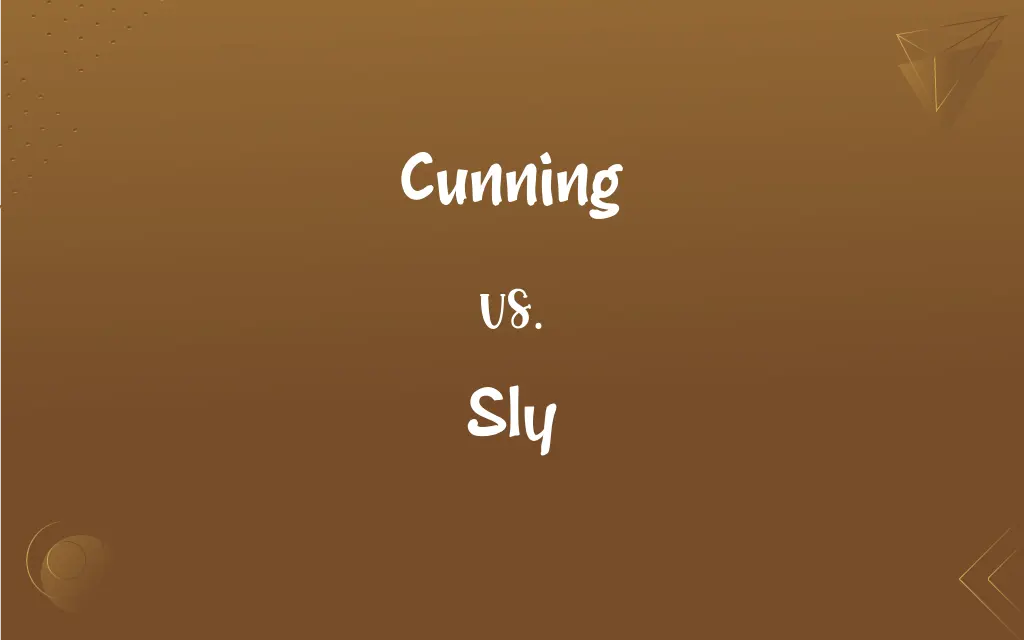Cunning vs. Sly: What's the Difference?
Edited by Aimie Carlson || By Janet White || Updated on February 5, 2024
Cunning involves skill in achieving goals through deceit or evasion, while sly implies a more subtle, clever form of deceit or trickery.

Key Differences
Cunning and sly both describe traits associated with cleverness and deceit, yet they convey nuanced differences in usage and connotation. Cunning implies an inventive or resourceful skill in achieving an end, often through deceptive means. It suggests a certain sharpness of mind and creativity in devising plans. Sly, on the other hand, emphasizes a more covert or secretive form of cunningness, highlighting the aspect of guile and stealth in trickery. Slyness often carries a lighter, less aggressive connotation than cunning, which can be admired for its cleverness but also feared for its potential ruthlessness.
Cunning individuals are often seen as being adept at navigating complex situations, using their intellect and creativity to manipulate circumstances to their advantage. This can involve strategic planning, psychological insight, and a keen understanding of human behavior. Sly individuals, while also clever, tend to rely more on indirect methods, using subtlety and understatement to achieve their ends. The slyness is in the art of implication, suggesting rather than stating, and leading others to conclusions without obvious coercion.
In literature and storytelling, cunning characters may be portrayed as masterminds or strategists, capable of complex schemes and plots. Sly characters, by contrast, are often depicted as more elusive and shadowy figures, using their wits to navigate through situations with minimal detection. Cunning characters might be admired or feared for their intelligence and strategic thinking, whereas sly characters are often beloved or amusing for their crafty, yet non-threatening maneuvers.
Despite these differences, both cunning and sly individuals share a common ground in their use of deceit or manipulation to achieve their goals. However, the admiration or disapproval of such traits can vary greatly depending on the context and the observer’s values. In some cultures or situations, cunning may be seen as a valuable survival skill, while in others, it could be considered morally reprehensible. Similarly, sly behavior might be regarded with affectionate amusement or with suspicion and mistrust, depending on the circumstances and the harm intended or inflicted.
Understanding the distinction between cunning and sly enhances our grasp of human interactions and the complexities of social navigation. While both involve a form of deception, the degree, method, and intent can vary, offering a rich palette for character development and interpersonal dynamics. Whether admired for their cleverness or criticized for their deceit, cunning and sly individuals remind us of the multifaceted nature of human intelligence and the ethical dilemmas it can present.
ADVERTISEMENT
Comparison Chart
Definition
Skill in achieving goals through deceit or evasion.
Cleverness in deception with a subtler form of trickery.
Connotation
Often implies admiration for resourcefulness.
Implies a lighter, more secretive form of deceit.
Usage
Describes complex schemes and strategic planning.
Involves subtlety, indirectness, and minimal detection.
Perception in Literature
Portrayed as masterminds or strategists.
Depicted as elusive, crafty figures.
Social Perception
Admired or feared for intelligence and manipulation.
Viewed with affectionate amusement or suspicion.
ADVERTISEMENT
Cunning and Sly Definitions
Cunning
The quality of being attractively ingenious.
The cunning design of the gadget won many admirers.
Sly
Clever in a secretive or nonobvious manner.
He gave a sly smile, knowing the secret.
Cunning
Clever at achieving one's goals by indirect methods.
His cunning plan secured the deal.
Sly
Skillful in underhand or indirect tactics.
With a sly maneuver, she avoided the question.
Cunning
Skillful use of deceit.
The spy's cunning allowed her to evade capture.
Sly
Capable of achieving goals through indirect, covert means.
Her sly approach got her the information unnoticed.
Cunning
Showing inventiveness and skill.
The artist's cunning use of color was impressive.
Sly
Having a cunning or deceitful nature.
The sly fox evaded the hunters again.
Cunning
Characterized by sharp insight.
Her cunning observations often led to breakthroughs.
Sly
Showing a cunning lack of transparency.
His sly comments left everyone guessing.
Cunning
Marked by or given to artful subtlety and deceptiveness.
Sly
Clever or cunning, especially in the practice of deceit.
Cunning
Executed with or exhibiting ingenuity.
Sly
Stealthy or surreptitious
Took a sly look at the letter on the table.
Cunning
Delicately pleasing; pretty or cute
A cunning pet.
FAQs
How is sly behavior typically characterized?
Sly behavior is characterized by cleverness and subtlety in deception.
What makes someone sly?
Someone is considered sly if they adeptly use indirect or secretive means to achieve their ends.
Can cunning be considered a positive trait?
Cunning can be seen positively as resourcefulness but negatively if used unethically.
How do sly individuals operate?
Sly individuals operate through stealth, subtly manipulating situations without overt disclosure.
Can cunning be used for good?
Yes, cunning can be used for good if applied ethically to navigate complex situations or solve problems.
What's the difference between being clever and cunning?
Cleverness implies intelligence and aptitude, while cunning involves using those qualities for deceitful purposes.
What does cunning mean?
Cunning refers to the skillful use of deceit or evasion to achieve one's goals.
Is cunning intelligence?
Cunning involves a form of intelligence, particularly in devising strategies and solving problems through indirect methods.
Is it better to be cunning or sly?
The preference depends on context; both can be effective, but their ethical implications vary.
Can animals be sly or cunning?
Yes, animals can exhibit sly or cunning behavior, especially in hunting or evading predators.
How can one counteract a sly individual?
Counteracting a sly individual requires vigilance, understanding of their tactics, and often, straightforward communication.
What literature often features cunning or sly characters?
Mystery, crime, and certain fantasy literature often feature cunning or sly characters as protagonists or antagonists.
Is it possible to be too cunning?
Being overly cunning can lead to distrust among peers and potential ethical breaches.
How do sly actions influence relationships?
Sly actions can strain relationships if they lead to mistrust or misunderstanding; transparency and honesty are generally preferred.
What is a sly remark?
A sly remark is one that implies more than it says directly, often with a hidden or double meaning.
Can a leader be cunning and still ethical?
Yes, a leader can be cunning in strategy and problem-solving while maintaining ethical standards.
How does society view sly behavior?
Society may view sly behavior with suspicion, although it can be admired for its cleverness in some contexts.
How do you recognize a cunning plan?
A cunning plan is often complex, well-thought-out, and aims at achieving a goal through indirect means.
What skills complement cunning?
Strategic thinking, psychological insight, and creativity complement cunning.
Are cunning and sly synonymous?
They are similar but not synonymous; cunning emphasizes skill and inventiveness in deceit, while sly focuses on subtlety and secrecy.
About Author
Written by
Janet WhiteJanet White has been an esteemed writer and blogger for Difference Wiki. Holding a Master's degree in Science and Medical Journalism from the prestigious Boston University, she has consistently demonstrated her expertise and passion for her field. When she's not immersed in her work, Janet relishes her time exercising, delving into a good book, and cherishing moments with friends and family.
Edited by
Aimie CarlsonAimie Carlson, holding a master's degree in English literature, is a fervent English language enthusiast. She lends her writing talents to Difference Wiki, a prominent website that specializes in comparisons, offering readers insightful analyses that both captivate and inform.































































